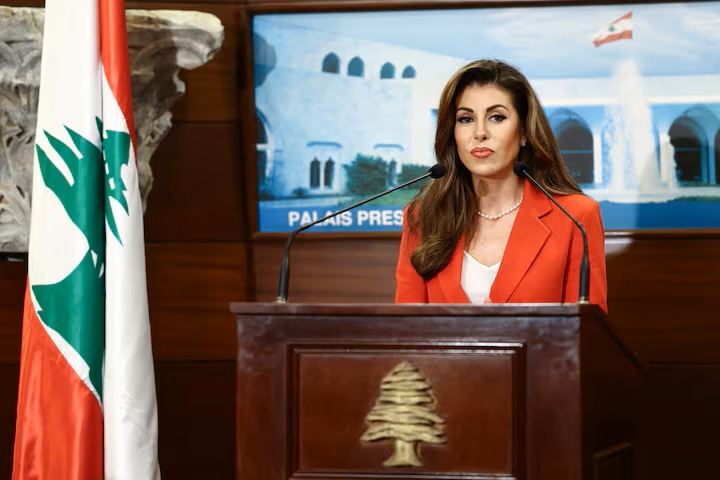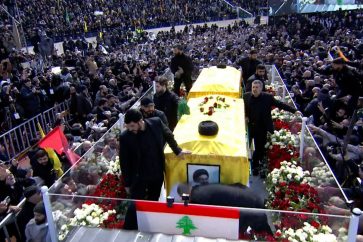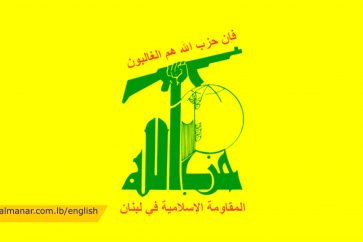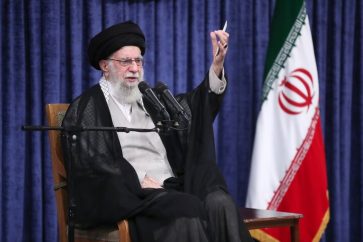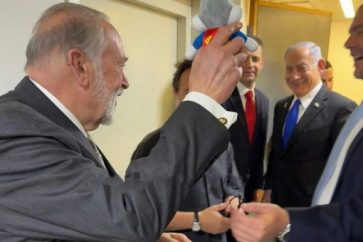We’re back with another visit from the deputy that enjoys flaunting illusory victory and a “religious” choice of jewelry. After a disappearance of almost two months, Morgan Ortagus, Deputy Special Envoy to the Middle East, returns on the 5th of April with a seemingly deflated sense of superiority as compared to the last time she took to the Lebanese stage.
Unlike the President of her administration’s successful use of his long years as a showman/comedian to stir approval, Ortagus quickly realized that she’s not bold enough to take that kind of heat. The protests that her statements started two months ago may have influenced the way she handled herself on this most recent visit, it could also be related to her two-month hiatus from Deputy work.
This time around, Ortagus relegated herself to private conversations with the 3 leaders of the Lebanese government summarized by their recounting of events. “Good and Constructive” were the titular adjectives utilized by President Joseph Aoun, Prime Minister Nawaf Salam, and Parliament Speaker Nabih Berri in description of their separate meetings with Ortagus, with Parliament Speaker Berri notably commenting on her lack of threatening language which was expected of her second visit.

It seems that after the fiasco of her first on-stage appearance Ortagus found it that much more difficult to brandish her empire’s bravado, going so far as to ditching her signature bling which she proudly showcased in her last visit.
However, its customary of US officials to perform at least one stunt per visit as a sort of “stir the pot” quota, otherwise they’ll realize how quickly people would forget they exist. Such is the case of Morgan Ortagus, whose stunt involved ignoring political etiquette in her current visit and instead of doing her duty to the nation she is sent to and proving (to a miniscule degree) that the US considers Lebanese sovereignty to be a real priority does a complete 180 and “invites” several ministers of the Lebanese state headed by the Minister of Foreign Affairs for a friendly lunch at the fortress the empire calls an “embassy” in Awkar. For comparison’s sake, the embassy in Lebanon is said to be the second largest US owned and operated complex in the world and is several times more massive and developed than any governmental building in the country, it is also yet to be finished as of today, which means it only stands to get bigger.
In an interview with Metro, MENA Uncensored editor-in-chief Leila Hatoum said about the US Embassy in Beirut: “They need it for logistics, for torture, for interrogation, to support their espionage missions across the region”.
Hatoum added: “This Embassy is not built to cater to Lebanese American citizens and for good, friendly relations… It is there to control Lebanon”.
Regardless of the obscure background the embassy exists for, Lebanon’s top ministers seem more than happy to answer Ortagus’s summons, those ministers being the Ministers of Energy, Public Works, Economy, Industry, Administrative and Financial Development, and the new Governor of the Central Bank of Lebanon. Ironically, the US state department’s own “Protocol for the Modern Diplomat” clearly states that “If your new position requires that you deal with the host country government or with its citizens, you should make appointments to meet them in their offices”. Which proves to a certain extent that this indeed was in service of the “stunt quota”, hypocrisy be damned.

In an interview with Al-Manar TV, journalist Mohammad Alloush dismissed the recent events as anything but coincidental. He emphasized that the deputy US envoy deliberately summoned the ministers to her country’s embassy rather than meeting them at their offices—a move the deputy had intentionally orchestrated. According to Alloush, this behavior reflects the US’ attempt to posture as regional high commissioners, much like those of the ye olden times of French and British occupation, issuing commands and compelling compliance.
He further elaborated that such meetings underscore the new US administration’s efforts to position itself as the political project’s primary sponsor in Lebanon.
While the empire’s influence may be amplified by its authoritarian tendencies, Ortagus remains merely the deputy envoy—whereas Lebanon’s foreign minister is the chief diplomat of a sovereign state. How, then, was Minister Raji convinced to compromise his country’s standing and comply with the embassy’s summons? Would he have done the same for another nation’s envoy? Or is it that when dealing with Uncle Sam’s representatives, there’s no real choice at all?
Morgan Ortagus’s latest visit may have been stripped of her usual bravado and bling, but the underlying message remains unchanged: the US still treats Lebanon not as a sovereign nation, but as a stage for imperial theatrics. Whether through private meetings or flagrant breaches of diplomatic protocol, the performance of power continues—and Lebanon’s political elite, by obliging so willingly, play their part all too well. The empire’s script hasn’t changed; only the delivery has softened. The question is, when will Lebanon stop reading from it?
Source: Al-Manar English Website

